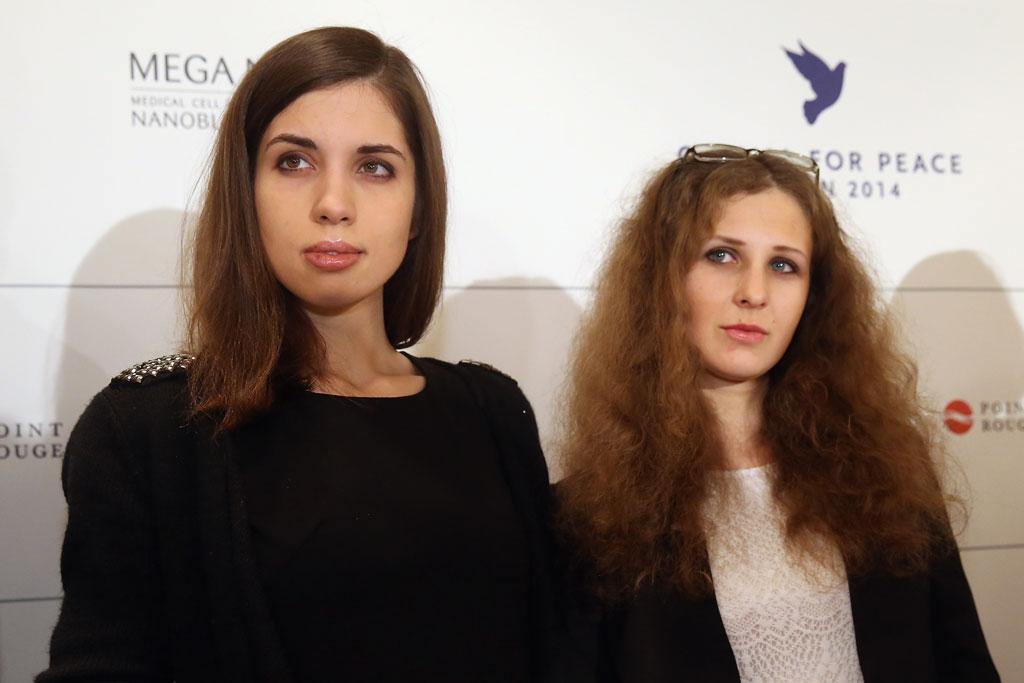Pussy Riot members say they might run for Moscow city government
Pussy Riot members Nadezhda Tolokonnikova (L) and Maria Alyokhina arrive to speak at the Cinema for Peace 2014 press conference at the Regent Hotel on Feb. 10, 2014 in Berlin, Germany.
Two members of the punk protest band Pussy Riot accused Moscow on Monday of obstructing their campaign to improve conditions in Russia's jails, and called for international monitoring.
Maria Alyokhina and Nadezhda Tolokonnikova, who were themselves freed from jail in December under an amnesty, also said they might consider stepping up their political activism by running for election to the Moscow city government.
The women served more than 21 months of a two-year term for performing a profanity-laced "punk prayer" protest against President Vladimir Putin in Moscow's main Russian Orthodox cathedral.
They have said they now want to devote themselves to helping Russia's prison population, including those jailed for protesting against Putin and his government, but complained during a visit to Berlin of obstacles being put in their way.
"The government has refused our request to register (our organization) 'Zone of Law'," Alyokhina told a news conference in Berlin, where a documentary about Pussy Riot was due to be shown at the Cinema for Peace gala on Monday evening.
"Pressure is also being exerted on people (supporting us)," she said, adding that their lawyer was under round-the-clock surveillance and other supporters had been interrogated by police and threatened with "more problems."
"The goal of our organization is to make prison administrations know that they cannot just treat prisoners as they want with impunity," she said.
Asked if they might consider running for political office, Alyokhina said: "We could think about the Moscow city government … Yes, I think we shall try."
Magnitsky Act
Human rights groups have long complained of conditions in Russia's jails, an issue that gained international prominence after the death of whistleblower lawyer Sergei Magnitsky in suspicious circumstances while in captivity in 2009.
That death prompted Washington to pass the 'Magnitsky Act' subjecting Russian officials implicated in the case to visa bans and asset freezes in the United States. Russia considers the act to be interference in its affairs.
"I consider the Magnitsky Act essential and we would encourage European countries to do likewise," said Alyokhina.
Before his death, Magnitsky complained of being denied medical care in a bid to get him to confess to tax evasion.
Alyokhina said denying medicines to prisoners was "not the exception but the rule" in Russian jails, adding: "We would very much like to see international observers in Russian prisons."
Since their release, the women have visited jails in the Netherlands and the United States to gather ideas on how to improve jail conditions in Russia, for example through cultural projects.
Russia has come under heavy Western criticism for its human rights record in the countdown to the Sochi Winter Olympics, especially over a new law that bans the promotion of homosexuality to minors.
"(The law) makes Russian citizens hate gay people by presenting them as an enemy from which our children must be protected," Alyokhina said.
(Editing by Kevin Liffey)
Our coverage reaches millions each week, but only a small fraction of listeners contribute to sustain our program. We still need 224 more people to donate $100 or $10/monthly to unlock our $67,000 match. Will you help us get there today?
